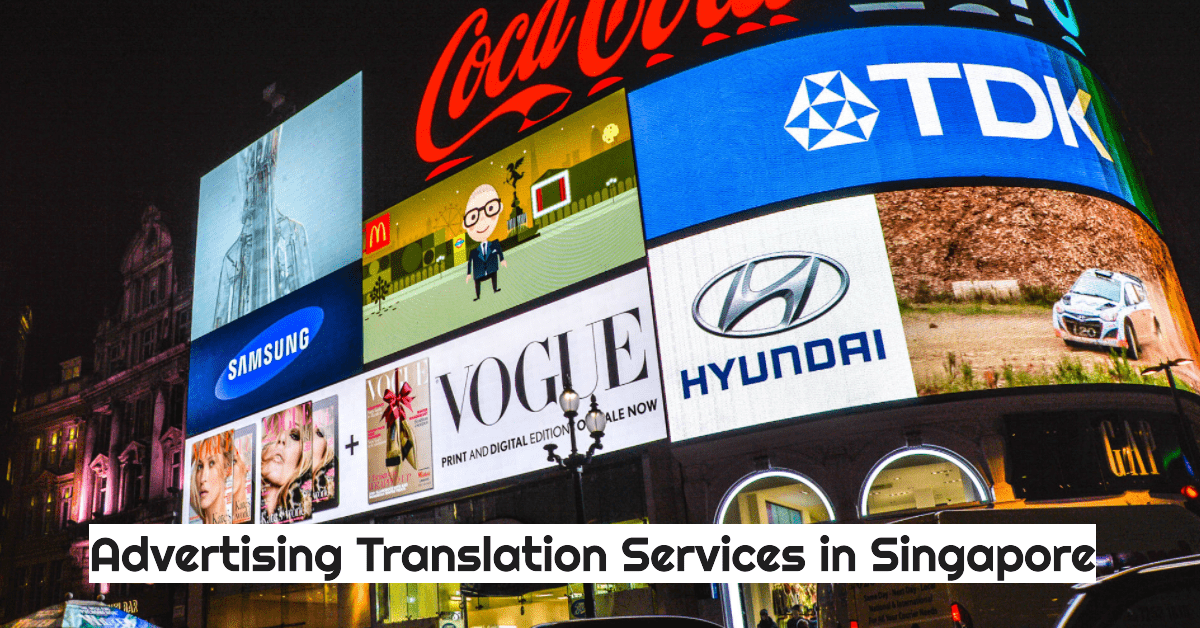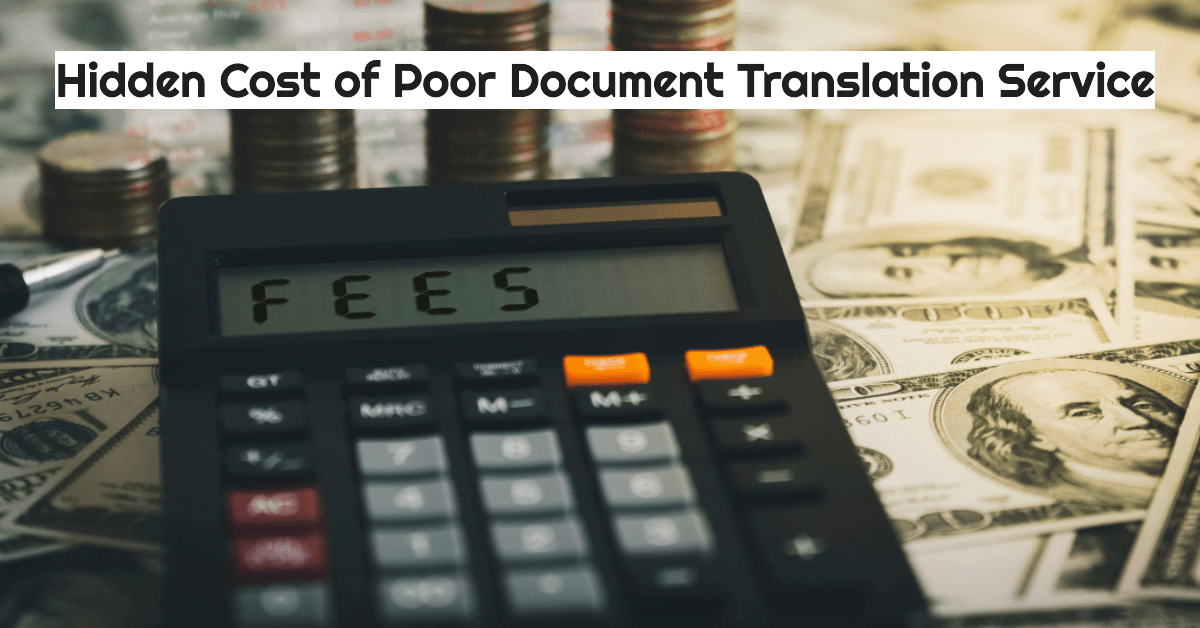Role of Transcreation and Translation Services for Advertising Industry
Did you know that effective communication is the most critical to successful advertising?
In today’s globalised world, reaching diverse audiences poses a significant challenge for brands.
How can they ensure their message resonates with people from different cultures and languages? This is where translation and transcreation services step in.
Translation services for advertising goes beyond converting words from one language to another; it bridges the gap between cultures.
By accurately conveying meaning and context, it enables brands to connect with their target audience on a deeper level.
Transcreation services take this a step further by adapting content to suit cultural nuances, ensuring maximum impact.
These vital services help global brands overcome language and cultural barriers, allowing them to tap into new markets and engage with customers worldwide.
With translation and transcreation, businesses can confidently communicate their brand story, products, and services across borders.
In an industry driven by effective communication, translation and transcreation service play an indispensable role.
They open doors to endless possibilities for global brands seeking growth in diverse markets.
Understanding Translation Services and Transcreation Services
Translation plays a vital role in accurately conveying content from one language to another. It involves the conversion of text while maintaining its meaning, tone, and context. This process ensures that the intended message is effectively communicated to the target audience.
On the other hand, transcreation goes beyond translation by adopting a more creative approach. It involves adapting content to suit cultural nuances, local preferences, and market-specific requirements. Transcreation allows for customization while preserving the core message and brand identity.
In the advertising industry, translation and transcreation serve distinct purposes:
Translation Services:
- Conveys content accurately across different languages.
- Ensures that information is comprehensible to diverse audiences.
- Maintains consistency in messaging across multiple markets.
Transcreation Services:
- Tailors content creatively to resonate with specific cultures or regions.
- Adapts slogans, taglines, and marketing campaigns to capture local sensibilities.
- Engages audiences on an emotional level by leveraging cultural references.
It’s important to differentiate between translation and transcreation in an advertising context. While both involve language adaptation, they have different aims:
- Translation focuses on linguistic accuracy and faithful representation of original content.
- Transcreation emphasizes cultural relevance and effective communication within a specific market.
By understanding these distinctions, advertisers can choose the most suitable approach for their campaigns. Whether it’s reaching a broader international audience through translation or connecting deeply with local consumers via transcreation, these services play a crucial role in ensuring impactful advertising campaigns worldwide.
Key Differences Between Translation Services and Transcreation Services in Advertising Industry
Transcreation Services in Advertising Industry
Focus on linguistic accuracy vs. creative adaptation
Translation services primarily focus on ensuring linguistic accuracy, aiming to convey the original message from one language to another. The emphasis lies in maintaining the integrity of the content while accurately translating words, phrases, and sentences. This approach is crucial for conveying information effectively across different languages.
On the other hand, transcreation services prioritize creative adaptation. Instead of merely translating words, transcreators adapt the content to evoke an emotional response from the target audience. They go beyond literal translations by considering cultural nuances and local market preferences.
Retaining original message vs. evoking emotional response
In translation, the primary goal is to retain the original message as faithfully as possible while making it understandable in a different language. The focus is on preserving meaning and ensuring that nothing gets lost in translation.
Transcreation, however, aims to evoke an emotional response from the audience by adapting the content creatively. It allows for flexibility and modification of elements such as tone, style, and imagery to resonate with the target market’s cultural context.
Cultural context and local market considerations
Translation services for marketing campaigns take into account cultural context by ensuring that translated content aligns with local customs, norms, and sensitivities. They consider factors such as idiomatic expressions or references that may not directly translate but are relevant within a specific culture.
Transcreation goes further by tailoring content specifically for local markets through extensive research on consumer behavior, preferences, trends, and cultural references. This approach enables advertisers to connect deeply with their target audience by creating campaigns that feel native to each market.
By understanding these key differences between translation and transcreation services in advertising, businesses can make informed decisions about which approach best suits their needs when expanding into new markets or reaching diverse audiences globally.
Best Practices for Transcreation and Translation Services in Advertising
Collaboration for Effective Results
Collaboration is key. Linguists, marketing specialists, and subject matter experts must work together to ensure the message is accurately conveyed while maintaining its impact. By combining their expertise, these professionals can create content that resonates with the target audience.
Cultural Nuances and Native Speakers
The importance of native speakers cannot be overstated in translation and transcreation. They possess an innate understanding of cultural nuances, allowing them to adapt the content appropriately. Native speakers bring authenticity to the message, ensuring it connects with the intended audience on a deeper level.
Briefing, Research, and Review Processes
To achieve effective results in translation and transcreation for advertising campaigns, proper briefing, research, and review processes are essential. Clear communication between all stakeholders sets the foundation for success. Thorough research helps identify any potential pitfalls or sensitive areas that need careful handling. Regular reviews throughout the process ensure accuracy and consistency.
Key Benefits of Professional Advertising Translation and Transcreation for Marketing Campaign
Effective advertising relies on conveying messages that evoke emotions, engage audiences, and drive action. This is where professional translation and transcreation services offer distinct advantages:
- Consistency in Brand Messaging: By working closely with clients, professional service providers uphold brand integrity throughout translated materials. They understand the importance of consistent messaging across different markets while adapting it appropriately for cultural nuances.
- Enhanced Customer Engagement: Accurate translations combined with creative adaptation enable brands to connect with their target audience on a deeper level. Tailoring content specifically for local markets enhances customer engagement by making them feel understood and valued.
- Increased ROI: Investing in professional translation and transcreation services ultimately leads to a higher return on investment (ROI). Effective communication fosters brand loyalty, boosts sales, and expands market reach by breaking language barriers.
Importance of Choosing a Reputable Translation and Transcreation Company like WhizWordz
When selecting a translation and transcreation company for your advertising needs, it is crucial to choose a reputable translation company. Working with WhizWordz International for your translation and transcreation services offer several advantages:
- Extensive Experience: With years of experience in the industry, companies like WhizWordz have honed their expertise in delivering high-quality translations and transcreations for diverse advertising campaigns.
- Client Satisfaction: Reputable companies prioritize client satisfaction by providing personalized service, meeting deadlines, and ensuring accurate translations that align with brand objectives.
- Industry Knowledge: A reputable company keeps up with industry trends and best practices to deliver cutting-edge solutions tailored to the advertising sector’s unique requirements.
Importance of Translation and Transcreation Services in the Advertising Industry
In today’s globalised advertising landscape, translation and transcreation services play a crucial role in reaching diverse audiences and driving impactful campaigns. The power of cultural adaptation cannot be underestimated, as it allows brands to connect with their target markets on a deeper level.
Understanding the key differences between translation and transcreation is essential for effective advertising. While translation focuses on linguistic accuracy, transcreation goes beyond words to capture the essence of the message while adapting it culturally. By leveraging transcreation techniques, brands can engage their target audience in a more personalised and meaningful way.
Professional translation and transcreation services are vital for ensuring high-quality output that resonates with consumers. By collaborating with experienced linguists who understand the nuances of different cultures, brands can avoid costly mistakes and maintain brand integrity across markets.
To maximise the impact of advertising translation and transcreation, it is important to follow best practices. This includes conducting thorough research on target audiences, using local idioms or slang when appropriate, and considering visual elements alongside textual content.
Remember that translating advertisements isn’t just about conveying information; it’s about evoking emotions and influencing purchase decisions. By utilising examples, stats, case studies, and social proofs in your campaigns, you can provide compelling evidence of your product’s value.
In conclusion, integrating professional translation and transcreation services into your advertising strategy is crucial for success in today’s global marketplace. Embrace cultural adaptation techniques to truly connect with your audience on a personal level.
Don’t miss out on the opportunity to expand your reach and drive business growth.
FAQs on Transcreation and Translation Services in Advertising Industry
1. How much do professional translation and transcreation services cost?
The cost of professional translation and transcreation services varies depending on factors such as project complexity, language pairs involved, word count, turnaround time required, etc. It is best to request a quote from reputable service providers who can provide an accurate estimate based on your specific requirements. Check out this translation service pricing blog article to find out more on how various pricing is utilised in Singapore.
2. How long does it take to translate or transcreate an advertisement?
The time required for translation or transcreation depends on factors such as project complexity, word count, language pairs involved, and the availability of resources. It is advisable to discuss your timeline expectations with your chosen service provider to ensure a realistic timeframe for completion.
3. How do I choose the right translation and transcreation service provider?
When selecting a translation and transcreation service provider, consider their experience in the advertising industry, their pool of qualified linguists, their quality assurance processes, and their ability to meet deadlines. Reviews and testimonials from previous clients can also provide valuable insights into their capabilities.
4. What languages can be translated or transcreated for advertising purposes?
Professional translation and transcreation services cover a wide range of languages spoken globally. Reputable service providers often have linguists proficient in major languages translations such as English, Spanish, French, German, Chinese, Japanese, Korean, Arabic, etc. It is best to inquire about specific language requirements when engaging with a service provider.




